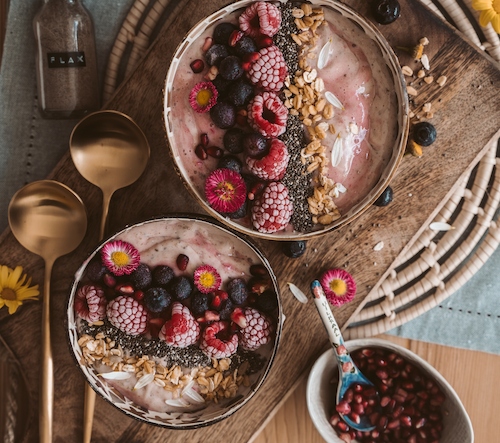
14 September 2022
Veganism beyond the plate: How to be vegan in all aspects of your life
It’s no surprise that my spiritual journey led me to veganism. Once I began to recognise and understand the divine energies that are at play, I began to feel more connected to all life. More than just a diet, at its core, veganism is about minimising harm to the planet and the fellow creatures we share it with. That’s why I’m passionate about learning all there is to know about leading a vegan lifestyle in every sense of the word.
From choosing what beauty products to pamper yourself with, to what type of candle to burn in your home, there are plenty of ways to veganise your life beyond what’s on the end of your fork.
Here’s how…
Vegan Beauty
Searching for good-quality, vegan and cruelty-free beauty products can be a bit of a minefield. Just because a company claims to be against animal testing doesn’t mean its products are automatically vegan. Common animal-derived ingredients used within the beauty industry include milk, honey and even snail mucin – all of which have extraction processes that can cause harm to the animals. While the ingredients I’ve mentioned are easy enough to spot on the back of product packaging, the same can’t be said for all animal-derived ingredients.

Here are some surprising non-vegan ones to watch out for:
- Retinol: an active form of vitamin A, retinol is found in animal liver, whole milk and fish. In cosmetics, however, most retinol is made from synthetic sources and should be vegan-friendly, but worth double-checking!
- Collagen: a protein found in the hair, skin, nails, bones and ligaments of cows and fish. Whilst there are vegan collagen-boosting products, there isn’t yet a true vegan collagen alternative.
- Lanolin: is common in lip and hair products to soften and moisturise, but it’s derived from sheep wool, meaning there’s no such thing as “cruelty-free” lanolin. Vegan alternatives include oils like coconut and olive, and butters like shea and coconut.
- Keratin: another animal-derived protein. This time found in the hair and horns of farm animals. Vegan alternatives include plant proteins like hydrolysed wheat, soy and corn.
- Shellac: a well-known nail product for its shine and durability, shellac actually comes from lac bugs, which are killed in their hundreds of thousands for people to have shiny nails.

Vegan Wardrobe
Curating a vegan-friendly wardrobe means avoiding clothing made from leather, feathers, fur, wool and silk. The thought of wearing another creature’s skin around my own while knowing the harm and pain it caused to fashion it into an item of clothing is deeply saddening. Rather than fill my wardrobe with cruelty, I like to shop for ethical alternatives without compromising my ability to self-express through fashion.
Luckily, there are lots of vegan-friendly options when it comes to fabric choices as many are plant-based by default, such as cotton, linen, bamboo and hemp. Being plant-based, clothes made from these materials are often more comfortable to wear since they allow our skin to breathe and our bodies to be at ease. There are also many natural alternatives to leather, such as cork and even plant-based leathers made out of oranges, apples and pineapples!
While textiles like rayon, nylon, PVC and polyester are also naturally vegan, there isn’t anything natural about them since they’re synthetic and commonly made from plastic. While you could argue that no animals are directly harmed in the making of a polyester jumper, once it is worn and washed, tiny bits of microplastics get released into the waterways and end up in the ocean. Underwater creatures eat the microplastics mistaking them for food which can cause harm. Instead, opt for clothing made out of recycled polyester or recycled ocean plastic and make sure to use a bag designed to stop microplastics from polluting the ocean.
Vegan Homeware
The home is our sanctuary. Our safe space. Our ritual setting. And, it’s where we can be our most authentic selves. This is why if you are committing to a vegan lifestyle and minimising your harm to other creatures take stock of the items surrounding you.
All items carry the energy of their previous owners. The same goes for items created at the expense of an animal’s life. You can feel the cruelty, pain and sadness vibrating off things made from ivory, bone, tusks, horns and teeth – they hold onto it. Avoid these items to maintain positive energy within your home, or if they are family heirlooms you don’t wish to part with, then try a cleansing ritual to reset the energy balance.
Again, as with your wardrobe, to have a vegan-friendly home, avoid textiles like leather, wool and silk. You can still add texture to your soft furnishings with other vegan-friendly materials like linen cushions or a woven jute rug. Or try out some of the alternatives mentioned earlier.
Any spiritual being will know how important candles are in your tool kit, but many candles are not vegan-friendly since they contain beeswax. Bees work incredibly hard to create the honey and wax designed to feed the hive through the winter. When these stores are harvested for human benefit, the hive’s health is compromised. Fortunately, there are many plant-based alternatives such as soy, coconut or rapeseed wax or a blend of natural vegetable waxes used to make vegan-friendly candles that smell and burn just as good.
I’ve only touched on three areas other than a diet where I think everyone would benefit from being more vegan. Once you start adopting and committing to a fully vegan lifestyle, you’ll really start to see how all creatures are connected and deserving of love and compassion. It’s a magical feeling that’s served to deepen my spiritual practice over the years.

